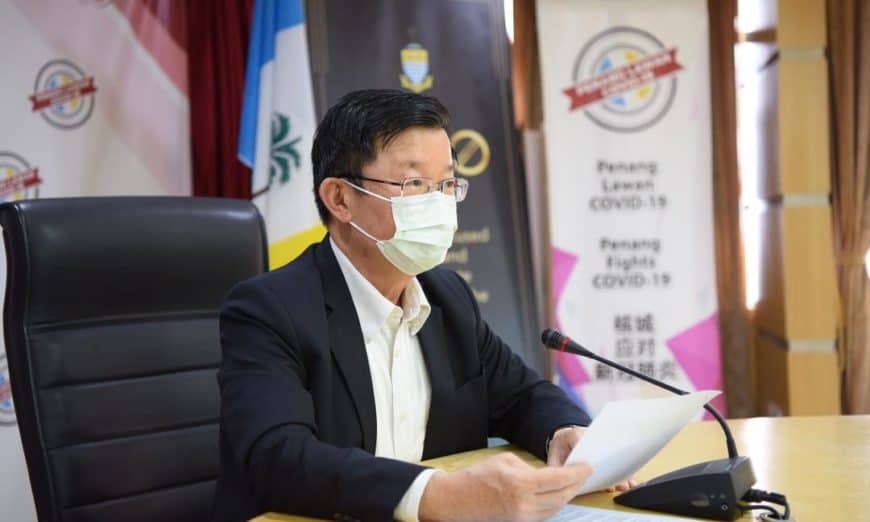THE annual general meeting (AGM) of PBA Holdings Berhad (PBAHB) has approved the declaration of a single tier final dividend of 1 sen per share for the financial year 2020.
Chief Minister Chow Kon Yeow announced this after the 21st AGM which was conducted virtually in compliance with Malaysia’s extension of the third movement control order (MCO 3.0).
As the chairman of PBAHB, Chow said that PBAHB had recorded a profit after tax (PAT) of RM24.76 million for its 2020 financial year and would be rewarding its shareholders with a final dividend.
“It is to be paid no later than three months from the date of approval.
“The year 2021 marks the 20th consecutive year in which PBAHB (Stock Reference: PBA – 5041) pays dividends to its shareholders. The company has paid dividends every year since 2002.
He said that PBAHB’s operational revenue was primarily generated from the sale of treated water in Penang by its main subsidiary, Penang Water Supply Corporation (PBAPP).
“PBAHB’s total revenue was RM336.3 million in 2020, as compared to RM340.2 million in 2019.
“The 1.1% decrease in total revenue (year-on-year) reflects a sideways shift in water consumption, following the imposition of successive MCOs in Malaysia and a resultant wider spread ‘work from home’ (WFH) culture in Penang in 2020.
“The total water consumption in the state was recorded at 309,224,456 cubic meters in 2020. This volume of consumption is 0.55% higher than 307,532,394 cubic meters in 2019.
“However, while domestic water consumption increased by 6.77% year-on-year, trade consumption decreased by 8.51%.
“Within the state’s existing water tariff structure, domestic tariffs are significantly lower than trade tariffs.
“For example, domestic consumers in Penang pay an average of RM0.32 per 1,000 litres for the first 35,000 litres per month while trade consumers pay an average of RM1.36 per 1,000 litres for the first 500,000 litres per month,” he said.
He said that, in short, PBAPP was compelled to bill less for marginally higher water consumption in Penang in 2020.
“Accordingly, PBAHB’s profit after tax (PAT) was RM24.76 million in 2020, as compared to RM25.15 million in 2019,” he added.
Chow said that PBAHB’s future prospects are linked to external factors that are beyond its control, such as the Covid-19 global pandemic and the Federal Government’s approval for a water tariff review.
“PBAPP is awaiting the Federal Government’s approval for a 2019 water tariff review application submitted by PBAPP to the National Water Services Commission (SPAN), at the behest of SPAN.
“This tariff review application was drafted in accordance with SPAN’s Tariff Setting Mechanism (TSM) formula.
“PBAPP is not the only Malaysian water operator which was compelled to submit a water tariff review proposal to SPAN recently.
“SPAN has conducted public consultation exercises for other proposed water tariff reviews in Kelantan, Terengganu, Pahang, Selangor, Labuan, Kedah, Perak, Melaka, Negri Sembilan and Johor, in the period of 2019 to 2021.
“The primary objective for PBAPP’s tariff review application is to raise sufficient funds for its proposed water supply projects to mitigate Penang’s raw water risks and address its future water demand,” Chow said.
Among PBAPP’s proposed key water supply projects in the period of 2021 to 2024 are:
- Phase 1 of the Sungai Kerian Water Treatment Plant (250 MLD) to treat raw water from the Sungai Perak Raw Water Transfer Scheme (SPRWTS);
- Package 12A of the Sungai Dua Water Treatment Plant (114MLD);
- The Sungai Perai Water Supply Scheme (136 MLD); and
- Phase 1 of the Penang Desalination Water Supply Scheme (250 MLD).
“PBAPP will not be able to raise sufficient funds to undertake these projects without a tariff review.
“While these projects will cost hundreds of millions of ringgit, the PAT for PBAHB amounted to RM24.76 million in 2020,” he said.
High domestic consumption is directly related to low domestic tariffs.
Chow said there is an urgent need to address the issue of high per capita domestic consumption.
“In 2020, Penang’s per capita domestic consumption was 299 litres/capita/day (LCD), as compared to the national average of 240 LCD.
“Penang’s average domestic tariff for the first 35,000 litres of domestic consumption per month is the lowest in Malaysia, at RM0.32 per 1,000 litres as compared to the national average of RM0.71 per 1,000 litres.
“In other words, Penang’s per capita domestic water consumption was 24.6% higher than the national average because its average domestic water tariff for the first 35,000 litres per month was 54.9% lower than the national average,” he explained.
Chow said that PBAPP’s domestic water subsidy to sustain low domestic water tariffs amounted to RM95.35 million in 2020, while PBAHB’s PAT was RM24.76 million.
He said that PBAPP was seeking a water tariff review for two practical reasons – to promote water saving in place of water wastage; and to reduce PBAPP’s domestic water subsidy so that it may have sufficient funds to invest in important water supply projects to mitigate Penang’s raw water risks and address its future water demand.

